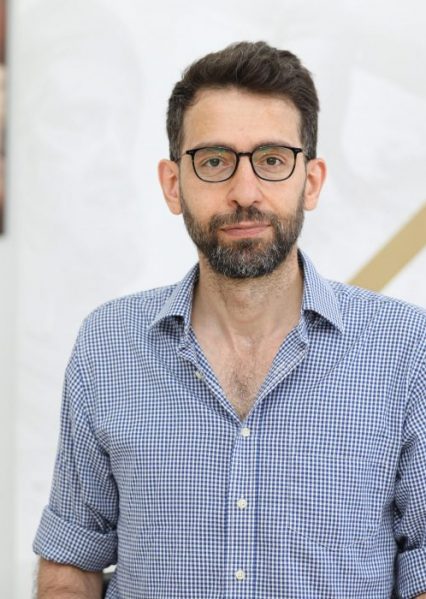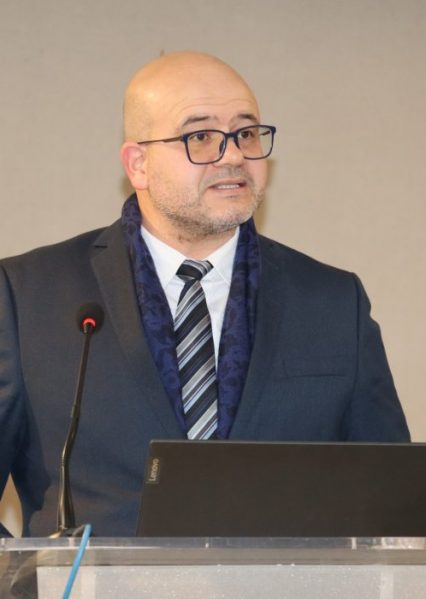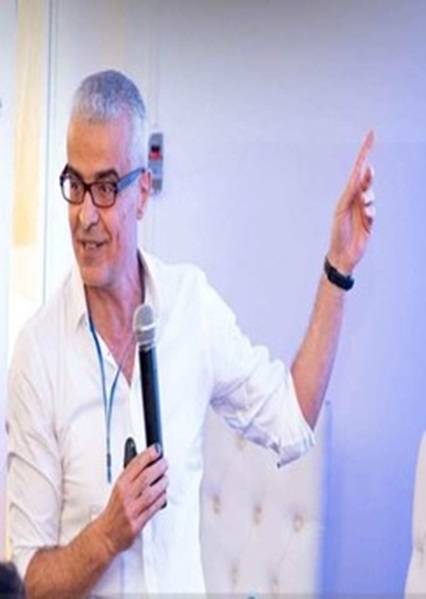Chaque année, MECAM offre à trois chercheurs de son réseau la possibilité de se rendre dans l’une de ses institutions partenaires en Allemagne pour une durée maximale de trois mois, dans le cadre du programme “Germany Research Visits”. Cela leur donne l’occasion de présenter leurs travaux de recherche à un nouveau public, d’utiliser les infrastructures locales et d’élargir leurs réseaux.
Dr. Imad Alsoos
Date de la visite : du 1er mai au 31 juillet (GIGA Institute for Middle East Studies, Hamburg)
Imad Alsoos est titulaire d’une bourse de la Fondation Gerda Henkel pour mener une étude comparative des pensées politiques musulmanes au Mashreq et au Maghreb, et examine la manière dont leurs interactions ont influencé le développement de la pensée politique du parti Ennahda en Tunisie. Entre 2023 et 2025, il a rejoint le MECAM pour étudier le parti Ennahda en Tunisie. Il a obtenu son doctorat en 2017 à l’Université libre de Berlin, avec une thèse consacrée au discours politique et à la mobilisation organisationnelle du Hamas à Gaza. Entre 2018 et 2023, il a intégré l’Institut Max Planck d’anthropologie sociale pour poursuivre ses recherches sur le Hamas.
Activités:
- Présentation sur le thème : « Généalogies de la pensée politique musulmane au Mashreq et au Maghreb : le cas de la démocratie musulmane d’Ennahda », dans le cadre du colloque IMES (GIGA Institute for Middle East Studies) (23 juillet 2025).

Projet réalisé pendant la visite:
This research project conducts a comparative study of Muslim thoughts in Mashreq and Maghreb and then examines the way their interactions have influenced the development of Ennahda Party’s political thought. Ennahda has evolved from a sharia-based approach (1969-1979), through an umma-based approach or Islamic democracy (1981-2010) to a Muslim democracy (ca.2011-present). The latest development represents the most advanced Muslim political thought in terms of the relationship between Islam and the modern model of state and civil society. Tracing Ennahda’s development demands an exploration of the movement’s historical and philosophical origins and the ways in which they have been renegotiated and transformed to adapt to the Tunisian political context. In theoretical and methodological terms, my research builds on Ibn Khaldun and Michael Foucault’s genealogical perspective, which argues that the cross-generational transfer of knowledge has neither a defined beginning nor a linear evolution. As such, Muslim democracy has emerged as a result of disparities between events, actors, unplanned situations and Ennahda’s own agency, which is conditioned by local context.

Dr. Riadh Ben Khalifa
Date de la visite: 1er juillet au 16 juillet (Forum Transregionale Studien, Berlin)
Riadh Ben Khalifa est un professeur associé d’histoire contemporaine à l’Université de Tunis, vice-doyen et directeur des stages à la Faculté des sciences humaines et sociales (depuis septembre 2024). Il est également membre de plusieurs réseaux consacrés aux migrations. Il est aussi rédacteur en chef de la Revue tunisienne des sciences sociales. Ses recherches portent principalement sur les migrations, l’asile et la mobilité dans les contextes de transition.
Activités:
- Conférence intitulée « L’historiographie des migrations en Tunisie : le cas des réfugiés » dans le cadre de l’atelier organisé par le Forum Transregionale Studien et le Centre Marc Bloch : « Diasporas, exils, migrants et réfugiés d’Europe au Moyen-Orient et en Afrique du Nord » (8-10 juillet 2025).
Projet réalisé pendant la visite:
My study examines protection systems for child and youth migrants in Tunisia after 2011, within the context of economic crisis, political instability, and growing hostility toward migrants. Although Tunisia has developed a pioneering legal framework for child protection -starting with the 1956 Personal Status Code, the ratification of the Convention on the Rights of the Child in 1991, and the 1995 Child Protection Code – the extension of these rights to migrants remains ambiguous, leaving them highly vulnerable.
The education system, once a driver of social mobility, now reproduces inequalities across regions, socio-economic levels, and gender, with migrant children particularly disadvantaged.Various actors are involved in protection, including ministries, public authorities such as the National Authority for the Fight Against Human Trafficking, and civil society organizations (CSOs). CSOs and international agencies play a vital role in denouncing rights violations, advocating for reforms, and pushing for inclusive policies. Their efforts contributed to the adoption of key laws, such as those against racial discrimination (2018) and human trafficking (2016). Nevertheless, Tunisia’s crisis-ridden context, combined with restrictive labor laws, forces many migrants into informal work. The 2021 trafficking report revealed that over half of identified victims were children, most of them foreigners and women. In sum, Tunisia possesses an advanced child protection framework, but its implementation remains weak. Strengthening collaboration between state institutions, civil society, and international partners is essential to ensure effective protection and inclusion of child and youth migrants.
This research stay enabled me to finalize a scientific article by deepening the analysis of the legal and institutional framework for the protection of child and youth migrants in Tunisia and to compare with other experiences. The findings from this research will contribute to an article that I plan to publish in a collective volume. Furthermore, an interview related to this work will be conducted for the Blog for Transregional Research (Trafo) to share preliminary insights and open the discussion to a wider academic audience.
Dr. Adel Karaa
Date de la visite: du 19 novembre 2023 au 22 décembre 2023 (Philipps-Universität Marburg)
Dr Adel Karaa est professeur de Méthodes quantitatives à l’Institut supérieur de gestion – Université de Tunis, et membre du Comité National de Recrutement des Professeurs Titulaires et Associés en Méthodes Quantitatives en Tunisie. Il occupe également le poste de directeur de l’école doctorale de sciences de gestion et informatique de gestion de l’ISGT-ESSECT-TBS, Université de Tunis.
Activités:
- Conférence sur le thème «Towards an Integrated Model of the Mediating Effect of the Process of Individual Perceptions on the Relationship between Job Quality and Mobility Intentions» dans le cadre du MACIE Research Seminar (Marburg Center for Institutional Economics) le 30 novembre 2023
Projet réalisé pendant la visite:
Do better employment conditions reduce migration and professional mobility intentions among higher graduate workers in Tunisia? An integrated model of real and perceived job quality.

The aim of this research is to establish an analytical framework for a better comprehension of the phenomena of migration and occupational mobility (turnover), which are increasingly prevalent among young graduates in Tunisia. Faced with the general deterioration in working conditions and job quality in the country, many of young graduates are more and more enticed to seek opportunities elsewhere in the hope of finding better living conditions.
Based on individual data from a survey of a representative sample of 814 higher education graduates working in various sectors and covering all regions of Tunisia, the study used an appropriate theoretical and empirical approach to develop an integrated model that schematically represents the process of managing individual career trajectories in the face of the diverse working conditions and job quality. By retaining a wide range of characteristics (salary, type of contract, social security cover, working conditions, holidays, health insurance, working hours, etc.), empirical investigations have revealed the high degree of heterogeneity in the jobs held by young graduates. In this respect, a typology of jobs is established, showing the existence of five categories that differ according to employment status (salaried vs. self-employed), degree of informality and quality of (environment) working conditions.
The estimated results of the aforementioned model corroborate also the mediating role of the cognitive, affective and emotional dimensions in the relationship between the type of occupation (i.e. objective dimension) and the mobility intentions (i.e. conative dimension) among young graduate workers in Tunisia. One of the main practical implications of this research suggests the need for intervention policies aimed at improving employment conditions, workplace quality and organizational practices that are supportive of employee well-being.

Dr. Elizabeth Bishop
Date de visite: du 1er octobre 2023 au 30 novembre 2023 (Philipps-Universität Marburg)
Dr. Elisabeth Bishop a rejoint le département d’histoire de l’État du Texas en 2008, titulaire d’un doctorat de l’Université de Chicago. Elle a enseigné tant au niveau du premier cycle qu’au niveau des cycles supérieurs dans ses domaines d’expertise, à savoir l’histoire du Moyen-Orient, l’histoire arabe postcoloniale et l’histoire de la guerre froide. Vous pouvez consulter son profil ici.
Activités:
- Conversation avec Diana Abbani sur le blog TRAFO for Transregional Research sous le titre «Arab Engagement at the World Festival of Youth and Students in the USSR in 1957 – A Conversation with Elizabeth Bishop» le 15 avril 2024
- Conférence sur le thème «Ghosts of Empire in Algeria and Egypt», dans le cadre de séminaire intitulé «Comparative History of Ottoman and European Imperialism» (Nessim Znaien) le 8 novembre 2023
- Conférence sur le thème « Cholera and Colonialism in the Maghrib: 1830-1837», dans le cadre du séminaire «History of the Epidemic, Hygiene and Care in the Maghreb» (Nessim Znaien) le 15 novembre 2023
Projet réalisé pendant la visite:
Under the slogan, “with diplomas, we will not make better corpses”, the UGEMA (L’Union générale des étudiants musulmans algériens) called an indefinite strike for 19 May 1956; this strike marked a turning point in Algeria’s national liberation struggle; with (and without) diplomas, organizers of the students’ strike became leaders for the new nation, eventually serving as cabinet ministers, diplomats, and general directors for the state petroleum company after independence. Understanding MECAM’s primary aim is to create a high-quality and flexible setting for peer-to-peer exchange and debate, I would complete revisions on a monograph regarding UGEMA which was active between 1955 and 1962. Research on this student organization after World War II relates directly to MECAM’s guiding theme “Imagining Futures: Dealing with Disparity” because the population estimate of 1955 introduced a term (“Français d’origine algérienne”) which represented a form of institutionalized disparity, and these students’ struggle for legal recognition brought them into the “imagined future” of the Front de libération nationale (FLN), which culminated in recognition of a République algérienne démocratique et populaire (RADP). Research on UGEMA also relates directly to MECAM’s IFG V, “Identities and Beliefs” because the students attained their legal status through France’s Law of Associations (1901), that guaranteed their administrative autonomy based on their cultural identity.
